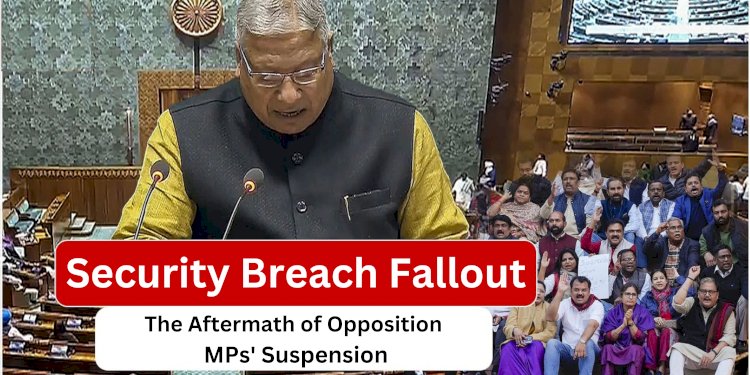Security Breach Fallout: The Aftermath of Opposition MPs' Suspension
In a tumultuous turn of events during the Winter Session of Parliament, 33 Opposition MPs, including key figures like Adhir Ranjan Chowdhury and Dayanidhi Maran, were suspended by Lok Sabha Speaker Om Birla for displaying placards in protest, demanding a statement from Union Home Minister Amit Shah on a security breach in the Lok Sabha. The suspension has sparked debates over the delicate balance between parliamentary decorum and the democratic right to dissent. The incident's ripple effects on legislative proceedings, the polarized reactions, and the historical context of parliamentary disruptions all contribute to the complex narrative unfolding in Indian politics.
By Shreya Rajvanshi Gangal

In a dramatic turn of events during the ongoing Winter Session of Parliament, 33 Opposition Members of Parliament (MPs) found themselves suspended by Lok Sabha Speaker Om Birla. The suspension, a response to the display of placards inside the House, has raised eyebrows and ignited debates across the political spectrum. Among the suspended MPs are prominent figures such as Adhir Ranjan Chowdhury of the Indian National Congress (INC), Dayanidhi Maran and A. Raja of the Dravida Munnetra Kazhagam (DMK), and Kalyan Banerjee of the Trinamool Congress (TMC). The protests were centred around a demand for a statement from Union Home Minister Amit Shah regarding a security breach in the Lok Sabha. This article delves into the details of the suspension, the reasons behind the protest, and the potential implications for parliamentary proceedings and the political landscape.
I. The Winter Session Turmoil:
The Winter Session of Parliament is traditionally a time for serious legislative business, with lawmakers addressing crucial issues facing the nation. However, the session took an unexpected turn as Opposition MPs, dissatisfied with the government's response to a security breach in the Lok Sabha, resorted to displaying placards inside the House. The visuals of chaos and protest have dominated headlines, overshadowing the legislative agenda that was meant to be the focus of the session.
II. The Trigger: Security Breach and Demand for Accountability:
The trigger for the Opposition's ire was a security breach in the Lok Sabha, an incident that had far-reaching implications for the safety and sanctity of the parliamentary proceedings. The demand for a statement from Union Home Minister Amit Shah was not merely a political manoeuvre but a legitimate call for accountability in the face of a security lapse within the hallowed halls of democracy. The refusal to provide a timely response appears to have driven the MPs to take the drastic step of protesting inside the House.
III. The Placard Display and Breach of Privilege:
The use of placards as a form of protest is not uncommon in parliamentary settings, but the consequences of such actions can be severe. In this case, the Lok Sabha Speaker invoked his authority to suspend 30 MPs for displaying placards, while an additional three faced suspension for the breach of privilege. The question of whether the punishment fits the offence has become a contentious issue, with some arguing that the suspension stifles the democratic right to dissent, while others assert that decorum must be maintained within the legislative body.
IV. The Suspended MPs: A Profile:
The list of suspended MPs reads like a who's who of the Opposition, representing a diverse range of political parties. From Adhir Ranjan Chowdhury, the Congress leader known for his vocal criticism of the government, to Dayanidhi Maran and A. Raja of the DMK, each suspended MP brings their political heft and perspective to the table. Understanding the backgrounds and political affiliations of these MPs provides insights into the broader dynamics at play.
V. Reactions and Responses:
The suspension of 33 MPs has not gone unnoticed, and reactions from both within and outside the political sphere have been swift. Opposition parties have condemned the move as an attack on democracy, accusing the government of stifling dissent. On the other hand, supporters of the suspension argue that parliamentary decorum must be maintained, and actions such as displaying placards are a breach of the established norms. Analyzing the varied responses sheds light on the polarized nature of Indian politics and the challenges of finding common ground on issues of contention.
VI. Implications for Parliamentary Proceedings:
The suspension of a significant number of Opposition MPs has immediate implications for the functioning of Parliament. The absence of these lawmakers from crucial debates and discussions may impact the quality of deliberations and decision-making. Additionally, the strained relations between the government and the Opposition could further hinder the passage of important legislation, potentially affecting the country's governance.
VII. Historical Precedents and Lessons:
To understand the gravity of the current situation, it is essential to explore historical precedents of parliamentary disruptions and the subsequent impact on the political landscape. Instances from the past where MPs faced suspension or other disciplinary actions for disruptive behaviour provide context for evaluating whether such measures lead to positive outcomes or exacerbate tensions between the ruling party and the Opposition.
Conclusion:
The suspension of 33 Opposition MPs during the Winter Session of Parliament marks a significant moment in India's political landscape. The incident raises critical questions about the balance between parliamentary decorum and the democratic right to dissent. As the nation grapples with the aftermath of this episode, stakeholders must engage in a constructive dialogue to restore normalcy and ensure that parliamentary proceedings serve the larger interests of the people. The coming days will reveal whether this incident becomes a turning point in the relationship between the government and the Opposition or remains a chapter in the complex narrative of Indian parliamentary democracy.
What's Your Reaction?



















